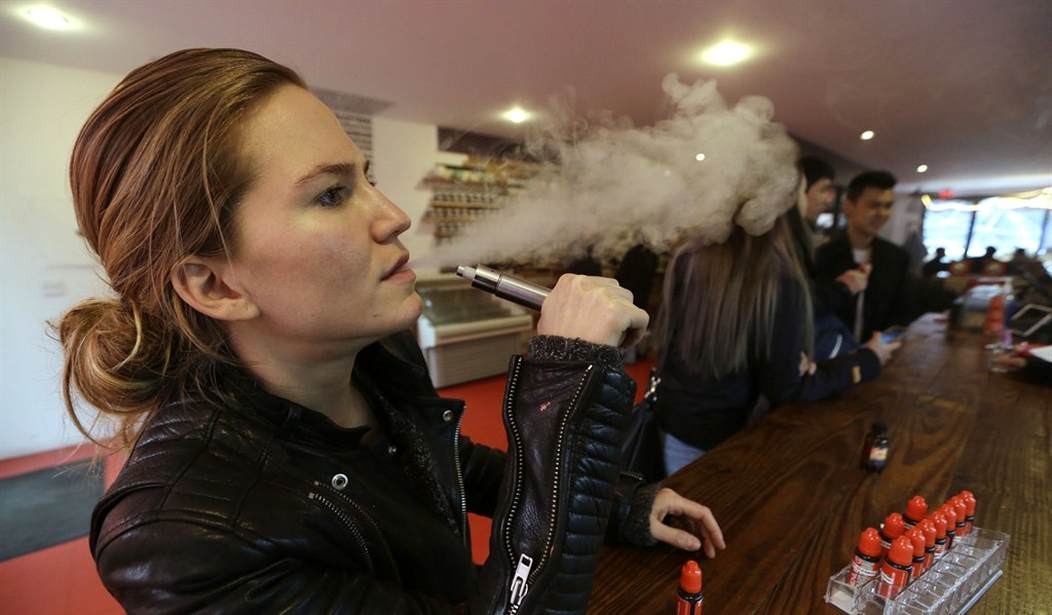"The plural of anecdote is not data," Frieden recently told The New York Times. But when it comes to the dangers that vaping poses, he abandons his scientific stance, claiming without evidence that "many kids are starting out with e-cigarettes and then going on to smoke conventional cigarettes."
No doubt Frieden and other e-cigarette alarmists will latch onto a new study that supposedly shows "Flavored E-Cigarettes May Entice Teens to Smoke," as one of the predictable headlines put it. But that is not what the study, reported this week in the journal Pediatrics, actually shows.
Looking at data from the 2014 National Youth Tobacco Survey, biostatistician Hongying Dai and economist Jianqiang Hao found that nonsmokers who had used an e-cigarette in the previous month were less likely than other nonsmokers to rule out trying tobacco cigarettes in the future. That is not terribly surprising, since just 3 percent of teenagers who had never smoked reported past-month e-cigarette use, a small minority that is apt to differ from the remaining 97 percent in traits, such as rebelliousness, risk aversion, and sensation seeking, that might affect the propensity to experiment with smoking.
Correlation is not causation. The fact that teenagers who vape are less inclined to say they will never smoke does not mean the experience of vaping made them that way. As Dai and Hao note, "we were unable to establish causal inferences" because "the data are cross-sectional."
Recommended
The idea that vaping promotes smoking seems implausible in light of the fact that smoking has fallen to record lows among teenagers even as experimentation with vaping has risen dramatically. Furthermore, teenagers who vape typically use nicotine-free e-liquids, and nonsmokers rarely vape often enough to develop a nicotine habit.
According to the Monitoring the Future Study, nearly two-thirds of teenagers who have tried vaping consumed "just flavoring" the last time they did it. In the same survey, less than 1 percent of never-smokers had vaped on 20 or more days in the previous month.
Dai and Hao seem to view flavored e-liquids, whether or not they contain nicotine, as a menace to the youth of America. "Flavored e-cigarette use is associated with increased risks of smoking among youth," they conclude. "Comprehensive tobacco control and prevention strategies that address flavored e-cigarette products are critically needed to reduce tobacco use among youth."
It is pretty clear what "address[ing] flavored e-cigarette products" means to Dai and Ho, who repeatedly note that the Food and Drug Administration does not plan to ban flavors as part of its otherwise onerous e-cigarette regulations. They worry that "widespread availability of flavored e-cigarettes will increase the use of e-cigarette products by youth" and that "the normalization of e-cigarette use among youth could also lead to e-cigarettes becoming a gateway for future smoking, marking a setback in the decades-long antismoking battle."
While there is little reason to think anything like that is happening, banning flavored e-liquids would make vaping less attractive to smokers, thereby discouraging them from making a switch that could save their lives. Contrary to the claims of politicians and activists who insist that candy and fruit flavors could not possibly appeal to anyone older than 17, adults who switch to vaping overwhelmingly prefer supposedly kid-friendly e-liquids.
In a 2014 survey by E-Cigarette Forum, three-quarters of adult vapers who had quit smoking or cut back said they favored flavors other than tobacco. A 2013 study likewise found that flavor variety is important for smokers who switch to vaping.
Dai and Ho are dismayed that the vaping market features "a large number of different flavors that might appeal to youth." But eliminating that variety would represent just the sort of setback they imagine it would prevent.

























Join the conversation as a VIP Member